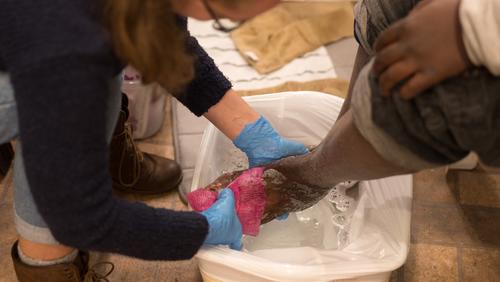
The New Haven PAWS (Poverty Alleviation through Washing Soles) Project held its biggest event of the year on November 9 as part of Hunger and Homelessness Awareness Week.
Volunteers from the Yale School of Public Health, Yale College and the greater New Haven community gathered early Friday morning at St. Paul & St. James Episcopal Church in the city’s Wooster Square neighborhood to wash the feet of over 70 individuals in a relaxing and personalized environment. Each person was able to engage in various foot health services and select a couple of foot hygiene items to take with them. Additionally, through a partnership with Soles4Souls and community donations, over 150 people experiencing homelessness received free shoes and socks.
Data was also collected to better understand the experience of the homeless community and to develop strategies for foot health management. Some clients claimed to walk anywhere from six to 15 miles a day and said that their feet are a constant health issue. “Some people have cars and, well, I have shoes,” one client said.
The range of foot problems common among people experiencing homelessness includes sores and infections, as well as complications from chronic conditions such as diabetes that cause the feet to swell and trap lint and dirt between the toes. After extended time on the street, most recently in wet and below freezing conditions, shoes can be difficult and painful to remove. “It takes tremendous trust for someone to take off their shoes in front of a bunch of Yale students,” said Marina Marmolejo, who along with fellow Yale School of Public Health student Trisha Ramsdell, organized the event.
You don’t know how amazing this is. I haven’t been treated like a human being in a very long time.”
“As Yale students, it can be difficult to engage with someone who is experiencing extreme poverty. It’s awkward and uncomfortable to have such a different lived experience than someone else, but it’s necessary for starting to dismantle the large systemic issues that have allowed our country to become so polarized,” said Marina and Trisha. “We understand that foot health is more than just a brand new pair of shoes, but believe that through the PAWS Project we can engage the greater Yale community in events that create solidarity with New Haven residents experiencing homelessness.”
After choosing a fragrant essential oil to add to the basin of warm water, one client said, “You don’t know how amazing this is. I haven’t been treated like a human being in a very long time.”
In turn, Marina and Trisha are committed to understanding and responding to clients’ immediate needs, while simultaneously starting conversations regarding long-term solutions to homelessness. “Many of the homeless in New Haven are working poor. I met a family that had lost their jobs and as a result, just three weeks later, lost their house,” said Trisha.
The PAWS Project has broad participation from students across the university. “Research suggests that interacting with marginalized individuals or populations can heavily reduce stigmatization,” says Marina. “The PAWS Project aims to create a space for Yale students to meet their homeless neighbors, which in turn can increase positive attitudes, behaviors, and political-decision making regarding the homeless community in New Haven. I see the PAWS Project creating lasting impact among the Yale-New Haven community because it provides an opportunity for students to care and cultivate a strong sense of responsibility for their local community.”
The PAWS Project was founded in 2017 by Ashton Gores, M.P.H.’18, to promote foot health as a basic human right. PAWS’ next event will be in January 2019.
For more information about PAWS, visit its Facebook page. You may also donate supplies for their next event through their Amazon wish list.